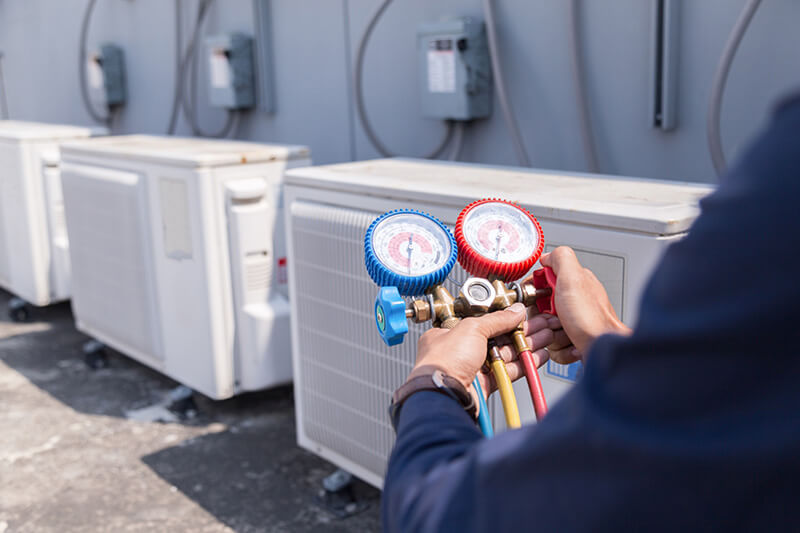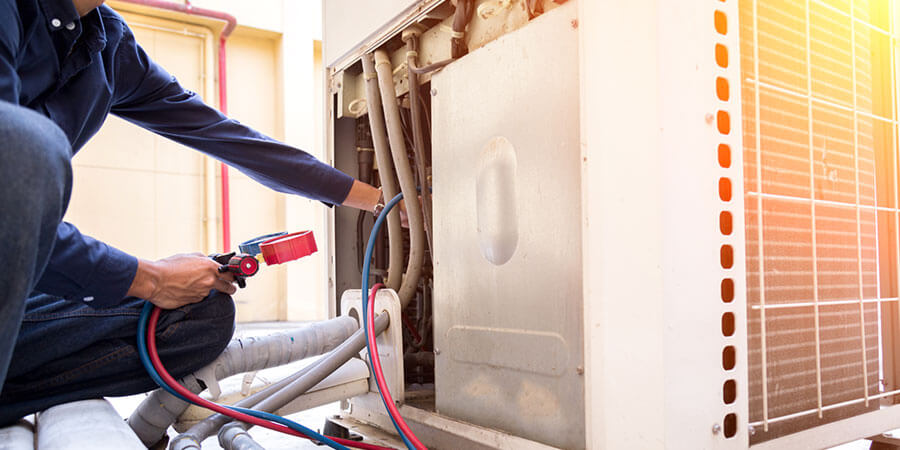Top Mistakes to Avoid During heat pump installation ooltewah tn
Top Mistakes to Avoid During heat pump installation ooltewah tn
Blog Article
Picking Between a Heatpump and Heating System: Trick Factors To Consider for Your A/c Needs
When examining heating options for heating and cooling needs, the decision in between a warmth pump and a heater can be complicated. Each system offers unique benefits tailored to specific environments and energy efficiency objectives. Understanding these distinctions is important for making an enlightened choice. Trick aspects such as installation expenses and environmental influence even more make complex the selection procedure. Which option absolutely straightens with one's comfort and sustainability choices? The adhering to areas will explore these considerations in information.
Recognizing Warm Pumps: Exactly How They Function and Their Benefits
While several house owners think about numerous heating alternatives, comprehending how warm pumps feature and their benefits can greatly influence their decision. Heatpump run by transferring warm instead of generating it. In the winter months, they extract warm from the outdoors air or ground and transfer it inside your home, while in the summer season, they reverse this procedure, cooling the home by getting rid of warmth outside. This dual performance makes them functional for year-round climate control.One of the key advantages of heatpump is their energy performance. They utilize substantially much less power contrasted to conventional heating systems, possibly resulting in lower utility expenses (ductless mini splits). Additionally, heatpump have a smaller carbon footprint, making them an eco-friendly option. They additionally call for much less upkeep than standard systems, adding to lasting price savings. Overall, recognizing the mechanics and advantages of warmth pumps can aid homeowners make notified choices concerning their home heating and cooling down needs
Checking Out Heating Systems: Types, Procedure, and Advantages
Heating systems can be found in numerous kinds, consisting of gas, electrical, and oil designs, each with unique operational mechanisms. Understanding these differences is necessary, as they impact performance and home heating efficiency. Additionally, furnaces supply countless benefits, such as constant heat output and integrity in colder climates.
Kinds of Heaters
Heater can vary considerably in layout and operation, with heating systems being a prominent selection among property owners. There are several kinds of furnaces, each using various fuel resources and innovations. Gas furnaces prevail, leveraging gas to generate heat successfully. Electric heating systems, on the other hand, make use of electric resistance to produce warmth, usually favored for their uncomplicated setup. Oil heaters, while less common, are effective in areas with minimal gas access (heat pump replacement ooltewah tn). In addition, condensing furnaces take full advantage of power performance by capturing and recycling exhaust gases. Each kind operates via a system of heat exchangers and ductwork to distribute warm air throughout a home. Understanding the differences in between these heating system kinds is essential for informed a/c decisions
Advantages of Furnaces
For homeowners looking for trusted heat throughout cool months, the advantages of heaters are considerable. Heating systems offer consistent home heating, making certain also temperatures throughout the home. They are particularly reliable in severe chilly, typically surpassing heatpump in icy problems. Various types, including gas, electric, and oil furnaces, provide versatility to satisfy varied demands and preferences.Furnaces likewise have a tendency to have lower preliminary installation expenses compared to heatpump, making them a much more obtainable alternative for lots of. Their durable design adds to a much longer lifespan, with numerous systems lasting over 15 years with appropriate upkeep. Furthermore, contemporary heating systems are often furnished with advanced technology for improved efficiency, which can bring about decreased energy bills. In general, heating systems remain a reliable selection for reliable home heating.

Energy Efficiency: Comparing Warm Pumps and Furnaces
When comparing power performance in between warmth pumps and heaters, the Seasonal Power Effectiveness Proportion (SEER) plays an important duty in establishing performance. In addition, an operational cost analysis reveals the long-lasting financial effects of each system. Comprehending these elements can guide property owners in making informed choices regarding their heating remedies.
Seasonal Power Efficiency Ratio
Energy efficiency plays an important role in the decision-making process between heatpump and heaters, especially when thinking about the Seasonal Energy Effectiveness Proportion (SEER) This statistics procedures the cooling efficiency of heatpump over an entire air conditioning period, providing a standard method to examine performance. Greater SEER scores indicate better energy performance, converting to lower power consumption and reduced utility expenses. On the other hand, furnaces are usually assessed utilizing the Yearly Fuel Usage Efficiency (AFUE) ranking, which shows heating effectiveness. When comparing these 2 systems, homeowners need to focus on SEER rankings for warmth pumps, as they directly effect overall energy savings and ecological sustainability. A complete understanding of SEER can notably affect the long-lasting satisfaction and cost-effectiveness of the selected cooling and heating option.
Operational Expense Analysis
Comprehending the operational prices related to heatpump and heaters is vital for property owners evaluating their choices. Heatpump usually supply higher power performance, converting electrical power into warm with very little waste. This leads to lower regular monthly utility bills, especially in modest climates. On the other hand, standard heating systems, especially gas models, may have reduced upfront expenses but can incur greater functional expenditures with time because of sustain costs and effectiveness ratings.Moreover, heatpump can work as both home heating and cooling down systems, potentially minimizing the requirement for different cooling and heating devices. While first investments for heat pumps may be greater, their long-lasting savings in energy performance can make them an extra affordable option for several houses. Cautious evaluation of local power rates is necessary to establish the most effective option.
Installation Costs: What to Expect for Each Heating System
Installment prices for home heating systems can vary considerably in between heatpump and furnaces, affecting homeowners' decisions. Heat pumps normally have higher ahead of time installation costs, usually ranging from $3,500 to $8,000, depending on the unit dimension and intricacy of setup. This consists of the exterior system, interior handling system, and needed ductwork modifications. Alternatively, heaters tend to have lower preliminary expenses, balancing between $2,500 and $6,000, which can be appealing for budget-conscious house owners. Nevertheless, setup expenses can enhance if substantial ductwork is required.Moreover, the choice of gas kind for heaters-- natural gas, lp, or electric-- can also influence installment costs. While warm pumps use power performance, their preliminary financial investment might hinder some purchasers. Ultimately, assessing installment prices alongside long-term savings and effectiveness will aid property owners in making informed choices concerning their furnace.
Environment Considerations: Which System Carries Out Better in Your Area
How do climate problems influence the effectiveness of furnace? The performance of warmth pumps and furnaces can vary considerably depending upon the regional environment. In modest climates, warm pumps succeed by effectively moving heat from the outside air, making them an energy-saving alternative. Their effectiveness diminishes in extremely cool temperatures, where they may struggle to remove enough warm. Conversely, heaters, specifically gas models, supply reliable and constant heat despite exterior problems, making them more suitable in cooler regions.In locations that experience milder winter seasons, heatpump can run efficiently year-round, giving both cooling and heating. On the other hand, areas with harsh winter seasons often take advantage of the robustness of heaters. Eventually, comprehending the neighborhood environment is vital when determining in between a heatpump and a furnace, as it straight impacts their functional performance and general performance.
Upkeep Requirements: Long-Term Treatment for Warmth Pumps vs. Furnaces
While both warmth pumps and heaters require regular upkeep to assure peak efficiency, their certain needs and care regimens vary significantly. Furnaces commonly require less constant focus, with yearly examinations sufficing to check for gas leaks, tidy filters, and analyze general performance. Their simpler layout often enables for uncomplicated repairs.In comparison, heatpump necessitate semiannual maintenance as a result of their dual function in heating & cooling. This consists of cleaning coils, inspecting cooling agent degrees, and making sure that both the indoor and exterior systems work at their best. In addition, heatpump upkeep often includes more detailed components, making specialist maintenance essential.Neglecting upkeep can lead to reduced performance and raised power costs for both systems. Inevitably, home owners must take into consideration these lasting treatment needs when choosing between a heatpump and a heater, as proactive maintenance can prolong the life-span and performance of either system significantly.
Ecological Influence: Choosing a Sustainable Home Heating Option
The environmental impact of heating unit is a critical examination for home owners looking for sustainable choices. Heat pumps are normally a lot more energy-efficient than typical heating systems, as they move warmth as opposed index to create it, substantially minimizing carbon discharges. By using renewable resource sources, such as geothermal or air-source heat pumps, home owners can better reduce their environmental footprint.On the various other hand, all-natural gas heating systems discharge greenhouse gases and contribute to air contamination, though they commonly supply greater warmth output. However, developments in modern technology have click to find out more resulted in the advancement of high-efficiency furnaces that minimize emissions.Ultimately, picking a furnace includes weighing performance against ecological influence. House owners are motivated to review local energy sources and motivations for renewable systems, making sure an option that aligns with both personal convenience and ecological responsibility. The choice affects not only instant comfort yet also lasting sustainability and environmental wellness.
Regularly Asked Inquiries
How Much Time Do Warmth Pumps and Furnaces Commonly Last?
The lifespan of heatpump commonly ranges from 15 to two decades, while heating systems can last between 15 to 30 years. Normal maintenance substantially impacts their durability and performance in giving heating options.
Can I Use a Heatpump in Incredibly Cold Climates?
Heat pumps can operate in incredibly cold climates, yet their effectiveness decreases as temperatures drop. In such problems, supplemental home heating sources may be essential to maintain comfortable indoor temperatures and ensure peak performance.

What Is the Sound Level of Heat Pumps Versus Furnaces?
The sound levels of heat pumps and furnaces differ substantially. Usually, warmth pumps operate even more quietly than conventional heating systems, making them more effective for those delicate to appear, while heaters may create louder operational sounds during home heating cycles.
Are Warm Pumps Suitable for Both Heating & Cooling?
Warmth pumps are undoubtedly appropriate for both cooling and heating (heat pump service). They operate by transferring heat, giving reliable temperature control year-round, making them a flexible option for house owners looking for an all-in-one cooling and heating option
What Size Heating Unit Do I Required for My Home?
Establishing the suitable size home heating system for a home calls for assessing variables such as square video, insulation high quality, regional climate, and the home's design. Consulting an expert can guarantee an exact assessment and excellent convenience. Warmth pumps normally provide higher power effectiveness, transforming electrical power right into warmth with very little waste. In moderate environments, warmth pumps excel by successfully moving heat from the outdoors air, making them an energy-saving choice. Conversely, furnaces, particularly gas designs, supply constant and trustworthy warm regardless of exterior problems, making them better in cooler regions.In locations that experience milder wintertimes, warm pumps can operate successfully year-round, supplying both home heating and cooling. Heat pumps are usually much more energy-efficient than conventional heaters, as they move warmth rather than generate it, considerably Full Article reducing carbon discharges. By making use of eco-friendly power sources, such as air-source or geothermal warmth pumps, house owners can better reduce their environmental footprint.On the other hand, all-natural gas furnaces release greenhouse gases and add to air pollution, though they commonly offer higher warm outcome.
Report this page